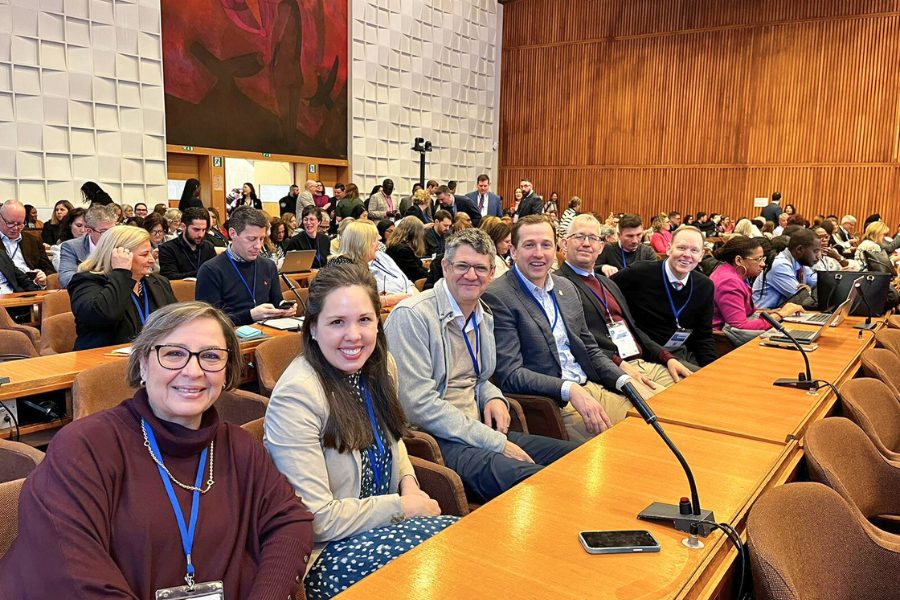A Celebration and Call: Inclusive Education and Each Student

250 million school-aged children do not have access to schools.
44 million teachers are needed globally.
These were the sobering numbers shared at the International Forums of Inclusion Practitioners to gather a delegation of educators to the United Nations Educational, Scientific, and Cultural Organization (UNESCO) in Paris for the Global Inclusive Schools Forum: From Practitioners to Policymakers.
Erik Ellefsen, Baylor Center for School Leadership Director of Networks and Improvement, led the North American delegation that included colleagues from CAST, Edify, Edvance, the Society of Christian Schools British Columbia (SCSBC), and Dr. Jon Eckert, Lynda and Robert Copple Endowed Chair for Christians in School Leadership.
Along with hundreds of policymakers, school leaders, and educators from around the world, Ellefsen and Eckert represented Baylor and had the opportunity to hear about the progress being made, the new challenges since the COVID-19 pandemic and displacement caused by war, and the global reality of a teacher shortage.
From the main stage on a panel with leaders from Europe, Asia, and Africa, Eckert had the opportunity to share about his team’s work at the Baylor Center for School Leadership, to highlight the work of colleague, Dr. Erik Carter, Luther Sweet Endowed Chair in Disabilities and Executive Director of the Baylor Center for Developmental Disabilities, and to encourage the worldwide delegations about the opportunities to educate each student in every country.
“What we really need to do is to figure out how each educator is prepared to provide feedback to each student, to make sure each student is engaged, and to make sure each student is well,” Eckert said. “We don’t serve all students; we serve each student.”
In 1994, UNESCO gathered 300 delegates from 92 countries to craft the Salamanca Statement on Principles, Policy, and Practice in Special Needs Education and Framework of Action, to reaffirm each student’s right to an education regardless of individual differences. The original document states,
"The guiding principle that informs this Framework is that schools should accommodate all children regardless of their physical, intellectual, social, emotional, linguistic, or other conditions. This should include disabled and gifted children, street and working children, children from remote or nomadic populations, children from linguistic, ethnic, or cultural minorities, and children from other disadvantaged or marginalized areas or groups."
Along with the opportunity that Eckert had to address the entire delegation and affirm 30 years later the work in the Salamanca Statement, Ellefsen was able to gather the delegation and report on a global panel of leaders from the Philippines, Lebanon, Indonesia, and Columbia on how they are engaging parents in the educational processes of their countries for better outcomes for students.
On this panel, the Secretary Director of Early Childhood Education of Indonesia shared encouragement from their country’s discovery that the impact of a “grassroots movement of parents will often outlast government policy” while another panelist stated that “you cannot separate education from the community.”
Ellefsen, with his colleagues in Canada, Darren Spyksma and Justin Cook, was able to participate in a think-tank on how to increase parent involvement in the educational system to maximize the knowledge of opportunities, decrease fear of the system, and increase the educational outcomes for students in local communities throughout the world.
The BCSL is built on the principles of collective leadership to catalyze improvement around the world. Collective Leadership encompasses the practices through which teachers and administrators influence colleagues, policymakers, and others to improve teaching and learning. Schools and systems require strong leadership from teachers, not leadership of teachers. Our schools should be teacher-powered, not teacher-proofed. For collective leadership to flourish, we need leadership from administrators–leadership that is strong enough to support the school’s mission, much of which must be led by teachers.
This concept of collective leadership and doing the work together with educators, school leaders, and policymakers is why Eckert and Ellefsen said they were excited to be part of such an amazing global event.
“At this event, educators were honored for the good and hard work they do, progress in the global effort for inclusive education was celebrated, new challenges were humbly addressed, and the opportunity to speak with policymakers about how to better increase access and opportunities for each student was at the forefront,” Ellefsen said.
In this work with global educators, there was hopefulness for the next thirty years as the team heard about remarkable progress, experienced the incredible professional capacity globally, and reaffirmed the desire to see each student thrive.